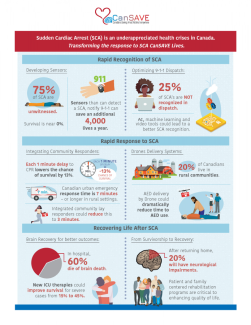Our VISION is to achieve the best survival rates from sudden cardiac arrest in the world. Our MISSION is to meet this challenge through defined, proactive and transformative research strategies and meaningful engagement of partners and stakeholders across the resuscitation landscape.
Transforming the Response to Sudden Cardiac Arrest
In 2020, The BC Resuscitation Research Collaborative ( BC RESURECT ) was successful in attaining the first of three UBC Grants for Catalyzing Research Clusters. They have provided the us the important opportunity to create and grow CanSAVE to spearhead innovative, national research collaborations with the goal to transform the response to SCA and dramatically improve survival. Our grand challenge is to further increase survival rates across Canada by focusing on 3 critical links in the chain of survival that are ripe for transformation: Improving recognition of sudden cardiac arrest; reducing response times for CPR and defibrillation prior to paramedic arrival; improving brain protection and brain recovery, and helping survivors live their best lives. To meet this challenge CanSAVE is spearheading and supporting national collaboration efforts and research in biosensor development, optimizing dispatcher recognition of SCA, community volunteer response, drone AED delivery, treatments for whole-brain ischemia, and improving quality of life for survivors of SCA. The impact of our transformational research will likely increase the number of survivors in Canada each year from 1,800 to 3,500 (comparable to the world's best) and potentially to 12,000 people.

Values and Commitments
Sudden cardiac arrest is an under-appreciated epidemic. It strikes over 100 Canadian citizens per day unexpectedly, only 5%-10% of whom will be resuscitated, leave hospital and return home to their loved ones. It affects all communities, age groups, socioeconomic groups, racial and cultural groups, and persons regardless of sex or gender identity.
- We are committed to training the next generation of resuscitation scientists.
- We value all our partners and endeavor to amplify and share our experiences
- We are committed to a culture of shared ideas from multiple perspectives.
- We strive for research excellence.
- We are committed to implementing relevant strategies as soon as possible.
- We intend to continuously live by, evaluate and improve upon these values.
Transforming the response to sudden cardiac arrest can bring people home to their loved ones, keeping families intact.
